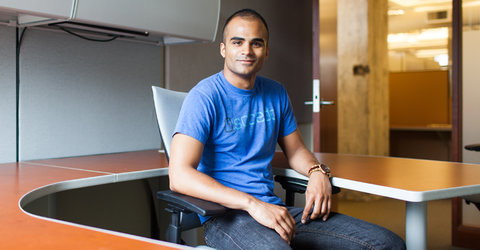 Matthew Ryan Williams for The New York Times Aseem Badshah has to decide which promising start-up to pursue.
Matthew Ryan Williams for The New York Times Aseem Badshah has to decide which promising start-up to pursue.
Case Study
What would you do with this business?
We just published a case study about a young entrepreneur, Aseem Badshah, who is torn between two ventures and needs to decide where to focus his time and energy.
His first business, Uptown Treehouse, creates online marketing campaigns. Three years old, it earns more than $300,000 a year on revenue of $1.3 million. His new idea is a software product called Socedo which scans social media and other public Web sites to find sales leads for clients. Mr. Badshah has 200 companies using a test version of the software and has received positive feedback.
Now he needs to decide if he should spend all his time on one of the businesses — or if he can split his time between the two ventures.
Uptown Treehouse is a successful, going concern, so if Mr. Badshah focuses all his energies there, he will face less financial risk. The company, however, offers limited growth potential that will be determined by the number of customers it can serve.
Alternatively, he could sell or close Uptown Treehouse and focus entirely on raising capital to build the Socedo team and technology. This option would be riskier because Socedo is an early technology start-up — but it also offers greater potential rewards because it is a software product, not a customized service, and could sell in high volumes quickly.
So far, Mr. Badshah is pursuing a third option: delegating the running of Uptown Treehouse to a general manager and using its profits to finance Socedo. He tries not to spend much time on Uptown Treehouse but concedes he is distracted by it. His eventual goal is to raise money from outside investors so that Socedo will not be dependent on Uptown Treehouse.
Below, you will find the recommendations of a serial entrepreneur, a small-business cash flow analyst and a start-up expert with both academic and business experience. Please use the comment section to tell us whether you agree or disagree with their advice — and to offer your own suggestions for Mr. Badshah. Next week, we will publish a follow-up.
Fred Dewey, former chief executive of Kachingle and current partner at Emotional Intelligence at Work, a training program: “Over the past three years, I was the C.E.O. of a start-up and spent some of my free time on another idea. We had a weekly conference call on my ‘spare-time project,’ where I gave input. Now it’s ready to fly and I’ve moved over to focus on it. Badshah should separate the two companies financially and divide his time 90 percent/10 percent between Socedo and Uptown. With discipline and a good Uptown general manager, he will be able to keep the value and profits of Uptown, while putting most of his energy into Socedo. Socedo’s funding plan A should be to raise outside capital with a plan B of using Uptown profits.”
Dan J. Cunningham, a financial and cash flow analysis consultant for small businesses over the past 35 years: “The revenue Badshah is making from Uptown Treehouse puts him in the top 1 percent of all American earners, so from a financial perspective, it would be difficult to see why anyone would want to give up that situation. It looks like he thinks his original company is not very exciting and that he won’t get a big payout one day where someone comes in and pays him millions and millions of dollars for his company. The risk of the new venture is, if the planning and assumptions are wrong, there will be no buyout and no millions and millions of dollars. There’s definitely something to be said for plodding along with a sure thing and making a lot of money while you do it.”
Steve Blank, an associate professor at Stanford University and author of “The Start-Up Owner’s Manual”: “Pick one business and commit to it. Betting on one idea focuses your heart, soul and all your energy on its success. If you are not fully committed to your idea, why would an investor commit to you? You can’t give your whole self to multiple girlfriends or boyfriends — it’s the same with business.”
What do you think?
Article source: http://boss.blogs.nytimes.com/2013/05/29/can-one-owner-build-two-start-ups-at-once/?partner=rss&emc=rss